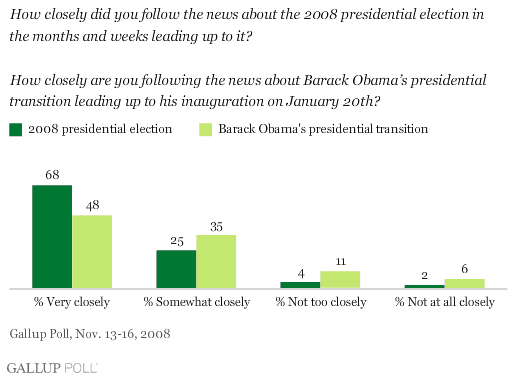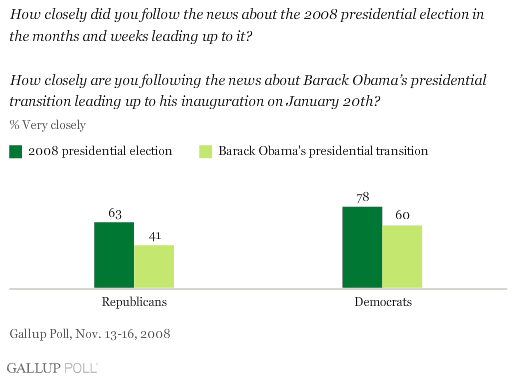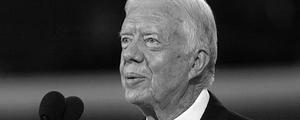WASHINGTON, D.C. -- While Americans are not currently as engrossed in national politics as they were in the months and weeks leading up to the U.S. presidential election, 83% say they are following the news of Barack Obama's presidential transition at least somewhat closely. Nearly half (48%) of Americans are following the transition "very closely," compared to 68% who say they followed the election as intensely.

Since the U.S. presidential election two weeks ago, nonstop election coverage has evolved into a nonstop presidential transition watch, with media outlets covering the president-elect's every move and constantly speculating about every possible staff and cabinet appointment. President-elect Obama has maintained a fairly low profile outside of his Nov. 7 press conference on the economy, his Nov. 10 visit to the White House, and an interview last Sunday night on "60 Minutes." The Nov. 13-16 Gallup Poll was conducted amid rampant speculation about Obama's possible appointment of former Democratic rival Hillary Clinton as his secretary of state and before his meeting with former Republican rival John McCain.
Not surprisingly, Democrats are more likely than Republicans to say they are paying very close attention to the presidential transition, 60% to 41%. Democrats are also more likely to say they paid very close attention to the election, reinforcing prior Gallup findings showing that Democrats were generally much more enthusiastic than Republicans about this year's election. Both groups have lost interest in the nation's leading domestic political story at roughly the same rate.

Not since Bill Clinton's victory in 1992 have Americans had the opportunity to witness a presidential transition that extended from Election Day to Inauguration Day, as George W. Bush's 2000 transition was delayed for weeks by the Florida recount battle. Gallup is tracking daily President-elect Obama's favorability rating, as well as Americans' confidence in his ability to be a good president, as key measures that can gauge rapid public reaction to the decisions he makes during this critical transition time.
Survey Methods
Results are based on telephone interviews with 1,009 national adults, aged 18 and older, conducted Nov. 13-16, 2008. For results based on the total sample of national adults, one can say with 95% confidence that the maximum margin of sampling error is ±3 percentage points.
Interviews are conducted with respondents on land-line telephones (for respondents with a land-line telephone) and cellular phones (for respondents who are cell-phone only).
In addition to sampling error, question wording and practical difficulties in conducting surveys can introduce error or bias into the findings of public opinion polls.
